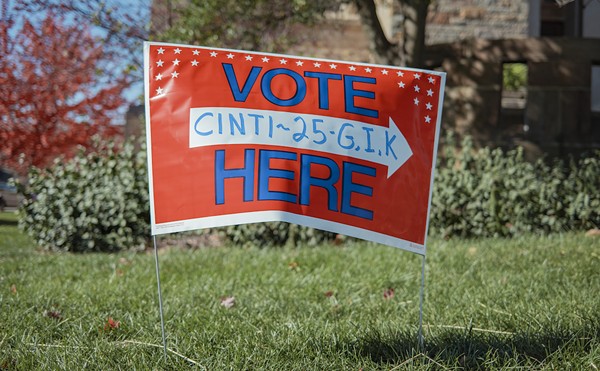
Photo: AP Photo/Gene J. Puskar, File
A man takes photos as a black plume rises over East Palestine, Ohio, as a result of a controlled detonation of a portion of the derailed Norfolk Southern train, Feb. 6, 2023. After toxic chemicals were released into the air from a wrecked train in Ohio, evacuated residents remain in the dark about what toxic substances are lingering in their vacated neighborhoods while they await approval to return home. (AP Photo/Gene J. Puskar, File)
After a derailed train full of toxic chemicals sent a plume of smoke above the homes in East Palestine, Ohio, Cincinnati City Council has started asking questions of Norfolk Southern, the rail operator responsible for the crash.
During a Budget and Finance Committee meeting on Monday, Feb. 13, Cincinnati City Council members discussed the financial conditions of a potential sale of the Cincinnati Southern Railway to Norfolk Southern for $1.6 billion, which was announced in November.
The 337-mile freight railway runs from Cincinnati to Chattanooga. Cincinnati is the only city in the country to own its own multi-state railway. Pending rule changes from Ohio's legislature, Cincinnati voters will ultimately decide whether or not to sell the railway in an election.
When a representative from Norfolk Southern appeared before council to answer questions about the terms of the sale, councilmember Liz Keating squared the conversation on the Feb. 3 train derailment in East Palestine, a relatively rural village near the Pennsylvania border.
“Given the issues going on in East Palestine, is the sale, the purchase of this railroad, still a top priority?” Keating asked. “Does [Norfolk Southern] have all the resources available to continue on with this sale?”
“The purchase of the [Cincinnati Southern Railway] is a top priority,” said Darrell Wilson, assistant vice president of government relations for Norfolk Southern. “And we do have the resources to follow through with the transaction in the proposed time frame of 2024.”
Wilson told council he is currently splitting his time between Cincinnati and East Palestine where he and dozens of Norfolk Southern employees have been trying to clean up the mess caused by a 50-car freight train that derailed, exploded and then released hazardous materials into the air.
Hazardous chemicals
Of the 50 cars that crashed, Norfolk Southern said 20 were carrying vinyl chloride, which is used to make a hard plastic resin used in a variety of plastic products. The colorless vinyl chloride has been associated with an increased risk of liver cancer and other cancers, according to the federal government’s National Cancer Institute. The Environmental Protection Agency (EPA) also released a complete list of the chemicals on board the derailed train, including ethylhexyl acrylate, isobutylene and ethylene glycol monobutyl ether, all of which the EPA said can have harmful effects if inhaled.
The EPA also said hazardous materials were found in samples taken from nearby waterways, including Sulphur Run, Leslie Run, Bull Creek, North Fork Little Beaver Creek, Little Beaver Creek and the Ohio River.
“I have seen the pictures of animals hurting from this, I have seen the destruction that has occurred there,” said Cincinnati resident Jack Cunningham during the public comment portion of the committee meeting. “There are a substantial amount of chemicals going into the atmosphere and local environment that are negatively affecting our watershed, going into the Ohio River and as such going into the Mississippi River and then the Gulf of Mexico.”
Fumes and smoke covered the town so severely that it warranted a week-long mandatory evacuation of thousands of residents, and East Palestine Mayor Trent Conaway called a state of emergency. On Feb. 6, Ohio Gov. Mike DeWine ordered residents to leave their village.
Even Erin Brockovich, the legal clerk whose investigation into a chemical leak in California spawned an Oscar-winning film, is now eyeing Ohio with suspicion.
"I’m trying to gather information on this very serious situation in Ohio involving a train derailment with hazardous chemicals," Brockovich tweeted. "What I will say is this. Trust your eyes, ears and nose and get the hell out of there if your senses are telling you too [sic]."
Payouts to East Palestine
Media reports suggest Norfolk Southern has only paid the people of East Palestine $25,000 in damages for the explosion, amounting to $5 per person in the town of 5,000 residents. But Connor Spielmaker, a representative of Norfolk Southern, clarified to CityBeat that the $25,000 payment was a Red Cross donation intended to help them set up shop in the village during the immediate aftermath of the explosion.“That was never something we were putting out there as a, ‘Oh, look how we’re helping the community,’ that was literally just within hours of the derailment we knew the Red Cross was setting up so we wanted to give them something quickly to support that,” Spielmaker told CityBeat.
Norfolk Southern assured the EPA that it will cover all the costs related to the evacuation and cleanup of the airborne toxic event. Spielmaker said Norfolk Southern has already spent more than $1 million making payments directly to families, businesses and city departments in East Palestine to cover the costs related to the evacuation.
Spielmaker told CityBeat that Norfolk Southern will soon announce another payment to a new fund called the “Community Giving Fund." He said the fund will be managed by a committee of East Palestine residents who will decide how the money should be spent.
“We’re going to ask that the city basically choose a couple people to sit on the committee that are local that knows where the money could help, versus a big corporation. We don’t know the community that well,” Spielmaker said.
When asked during council’s meeting how the company would approach paying damages if a similar disaster were to happen in Cincinnati, Wilson spoke at length about the recovery effort in East Palestine.
“First of all, we can’t change what happened. But Norfolk Southern, Alan Shaw our CEO has spoken to Gov. DeWine probably 10 times in the last week, maybe more. We are onsite today with a hundred contractors. We have at least 30 [Norfolk Southern] people there on the ground working to still remove the rail cars. We had over 50 cars derail. You know, it’s an accident; accidents of this magnitude do not happen very often. Very infrequently. This one did involve 10 tank cars of HAZMAT, and we did have to do some really extraordinary things that have never happened in my 22 years with Norfolk Southern. We are committed to be with that community to get it right,” Wilson said.
As of Feb. 13, Norfolk Southern is reportedly worth around $55.26 billion. Wilson glossed over the question of legal claims in East Palestine, saying it will play out over time.
“For the process of damages and legal claims, that’s going to play out over a longer period of time, but we’re not going anywhere,” Wilson said.
Questions about safety measures
Reports indicate Norfolk Southern lobbied for lighter regulations on train safety before the incident in East Palestine. Documents show the company pushed for a more narrow definition of what constitutes a “high-hazard” train, making many trains hauling dangerous materials exempt from the high-hazard safety requirements. Norfolk Southern lobbyists also pushed back on requirements from the federal government to swap out Civil War-era brake systems for safer electronic brakes on trains that carry hazardous materials, saying the requirement would “impose tremendous costs without providing offsetting safety benefits.”
Councilmember Mark Jefferys asked Wilson to explain any safety measures that Norfolk Southern plans to adopt or change to prevent another disastrous crash. Wilson responded by pointing out that Norfolk Southern is hiring.
“We’re hiring at Norfolk Southern,” Wilson said. “We have the largest conductor trainee class ever assembled at our McDonough training center south of Atlanta right now, about 800 people. We’re gonna continue to hire several thousand more this year. We were able to recover our crew base over the last 12 months and we’ve hired some 2,500 conductor trainees that we’re marking up on the road. So, we are actively trying to hire, and it is a very tough climate. If you look at the statistics, there are roughly 10-and-a-half jobs available for every applicant right now across this country.”
Jefferys told CityBeat that Wilson didn’t answer his question.
“To be honest, it didn’t answer my question. I think what has been reported that I want to understand is a couple of things: First, their opposition to improvements on brake systems that would enable more of the rail cars to brake more evenly, hence avoiding it crumbling up,” Jefferys said.
“There have been reported labor concerns, reports of people during COVID being forced to come in, working without vacation, etc. and looking at the impacts of that.”
Jefferys said he’s put in a request to the city manager’s office for a forum where community members can ask questions and express their financial and environmental concerns regarding Norfolk Southern.
“We have two choices,” Jefferys said. “One is we sell the railroad to Norfolk Southern or we lease it to them for 25 years. They have a right to lease it for the next 25 years. So one choice or another, we are dealing with Norfolk Southern. They will be operating trains on that line whether they’ve bought it or they’re leasing it.”
Monitoring water close to home
Greater Cincinnati Water Works (GCWW) released a statement on Feb. 14, saying the agency is monitoring the water supply for hazardous chemicals from the explosion in East Palestine, which is connected to Cincinnati via the Ohio River, which GCWW says actually works to Cincinnati's advantage.
"During the past few days, our scientists have looked at the size and location of the spill and calculated the travel time of the spill’s plume to reach Cincinnati. This is an advantage of the Ohio River, as its large size helps with diluting a spill, making it easier to treat," the statement reads. "GCWW is also looking at how we treat the spill if the plume reaches Cincinnati. We know that trace amounts of this chemical can cause minor odors to the water, but through conventional treatment and the use of powdered activated carbon, we can ensure a supply of safe and healthy water remains available to our customers."
Follow CityBeat's staff news writer Madeline Fening on Twitter and Instagram.
Coming soon: CityBeat Daily newsletter. We’ll send you a handful of interesting Cincinnati stories every morning. Subscribe now to not miss a thing.
Follow us: Google News | NewsBreak | Reddit | Instagram | Facebook | Twitter






